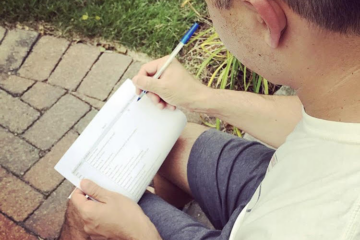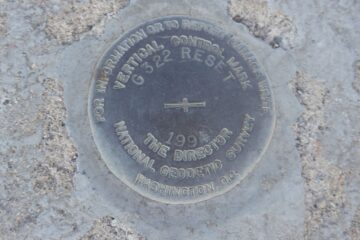Geocaching tourism – a good idea…
To boost tourism with geocaching sounds at first like a good idea. A scavenger hunt to playfully draw attention to the local highlights, that appeals to young and old. An activity for the whole family. Furthermore the idea can arise quickly that this can easily generate additional income. Such a tour only has to be created once and then supposedly does not require any personnel expenditures. You could rent GPS devices and make a cash up with a few extra euros for the community.
However, the reality looks often different. Many tourist information points in different cities have their own geocaching routes. Elaborate flyers were printed and expensive GPS devices were purchased and now they dust up in the closet. The stations in town usually don’t get better over time as well. Equipment disappears, gets damaged and will be not repaired.
Because there is no demand there is of course no urgent need to keep the route in good condition. It is a vicious cycle: no demand => no maintenance => bad impression for the customer => even less demand => … But if geocaching is said to be such a sought-after activity with millions of players worldwide why are tourist information points no longer being noticed?
Planned past the customer
The answer is quite simple: most tourist geocaching offers do not consider the needs of the players!

It is the fact that geocachers are actually very active and constantly interested in new geocaching series and offers – but only if they are also on their platform! When I complete a geocache, as geocacher I either log it online on the geocaching.com platform via the corresponding app or via the website. For this I get a point as a player and other players can see what I have done and achieved. Yes, geocaching is for many primarily about points, comparisons and the meaning. Geocaching is a highly statistics-driven game. There are a number of pages on which geocachers can create, view and share statistics in a wide variety of categories. This adorns each user’s profile.
And for people who are new to geocaching the game may actually not be immediately understandable. The operation of the (mostly old-fashioned) GPS devices is not always intuitive, furthermore frustration arises when you make a mistake while typing, therefore getting lost; or you find nothing on the site because the series is poorly maintained.
Creating geocaching tourism in a better way?!
Geocaching indeed is a powerful marketing tool! Ambitious players plan their vacation from a geocaching perspective. We know this pretty well because we run a quite successful geocaching travel agency based thereon (Cacher-Reisen).
Hence geocachers drive around where there are exciting geocaches and spend several days there, depending on the offer. This leads to overnight stays and secondary income from sales in the gastronomy, while refueling, etc
If you know this as a city, region or municipality you can of course take advantage of that. All what is required is a correspondingly attractive offer which would be: many or unusual geocaches.
These are actually the two criteria for geocachers to take further paths: either for many geocaches (the point ratio must be in proportion to the effort of the drive) or for special geocaches which are away from the crowd according to the way they are designed.
Would it not be possible just to add the existing tourist geocaching tours and series to the platform?
Theoretically yes, practically not. Because there exists an extensive set of rules on the geocaching platform which is not easy to understand for laypersons.
Successful use of geocaching in tourism
Some successful concepts, such as in Hannover, Oldenburg or Fläming, prove that there is another way.
At this locations, some very appealing geocaching tours were implemented by the players themselves!
One can assume that geocachers know actually very well what other geocachers might like. Probably even better than Tourist Information staff. So this approach has worked well.
In the mentioned cities, the geocaches were moreover put together for so-called GeoTours. These are marketing packages, which presents the rounds separately on a global portal and are intended to draw geocachers’ attention to the locations.

If a municipality wants to use geocaching as a marketing tool it has several options. It would make sense to contact the local geocaching community and get them excited about the project. This has many advantages: the geocachers are familiar with the rules because they know what others might like, they are networked and they also like to take care of the maintenance and care of the caches.
If this option may not exist because geocachers might sparesly be located there or they do not want to cooperate, you can of course contact us. Our team consists exclusively of geocachers and we have several years of experience.
A combination of both variants is also conceivable. We did that already in Oldenburg. There the geocaches were created and planned by us but then passed on to the local community.
So far the model has worked well.
In all cases the question arises: rather many geocaches or rather a few but with very special treasures?
Currently the trend goes towards large extensive tours with as many (larger) containers as possible. This also has its downsides. The prospect of many possible points attracts the players massively. This has its consequences: the high traffic has an impact on the environment and sometimes also affects the nature. Good planning and consultation is required for example with the nature conservation authorities prior to placing caches. Another factor that has to be considered is the rather high maintenance effort. Many caches mean many places, many logbooks to be exchanged and containers which need to be replaced.
We prefer extraordinary geocaches which impress due to their creativity and craftsmanship. This also has advertising effects because such geocaches are often photographed, filmed and shared on social media by the players.
Whichever way you decide, the most important thing is the implementation of geocaches on the world’s largest platform: geocaching.com! Without that implementation, the tour, however beautiful it may be, will have a sad niche existence.
Have you worked with tourism agencies to hide caches? Tag us in photos of your caches – @geocachetalk on Twitter and Instagram; @Geheimpunkt on Twitter and @geheimpunkt.de on Instagram. What are your plans to bring more geocachers to your part of the gameboard?
Daniel, aka daniel354 (private, just for searching) and geoheimnisträger (business, just for hiding), started Geocaching in February 2008 while working with disabled kids and organizing their free time activity. The first cache made him addicted and on that same night he bought his first GPS Device on eBay. It got big pretty quickly in his life, so he started thinking about how to make it his job. First idea was a geocaching webshop which he started in 2010. Shortly after this he started with organized geocaching events for companies as an incentive. That is how “Geheimpunkt” started. Later on he came up with the idea of a geocaching travel agency (http://cacher-reisen.de/) and a geocaching marketing agency (https://kundenschatz.de/). Daniel prefers Night-Caches, Lost Place Multi Caches, T5 geocaches and really extreme caches like this long distance cache https://coord.info/GC3JH5D (900 miles on my bicycle). You can reach him at: +49 511 70023561 or info@geheimpunkt.de.
The Geocache Talk blog wants your geocaching-related stories and insights – and cache hiding tips! Please contact me, Angie (aka @GeoJangie), to write a guest blog post or if you have any recommendations for subjects or authors. I can be reached via my email: JangieGoWest@gmail.com or through Instagram, Twitter, or Facebook.
Enter your email address below to receive each new Geocache Talk blog post directly into your inbox!




